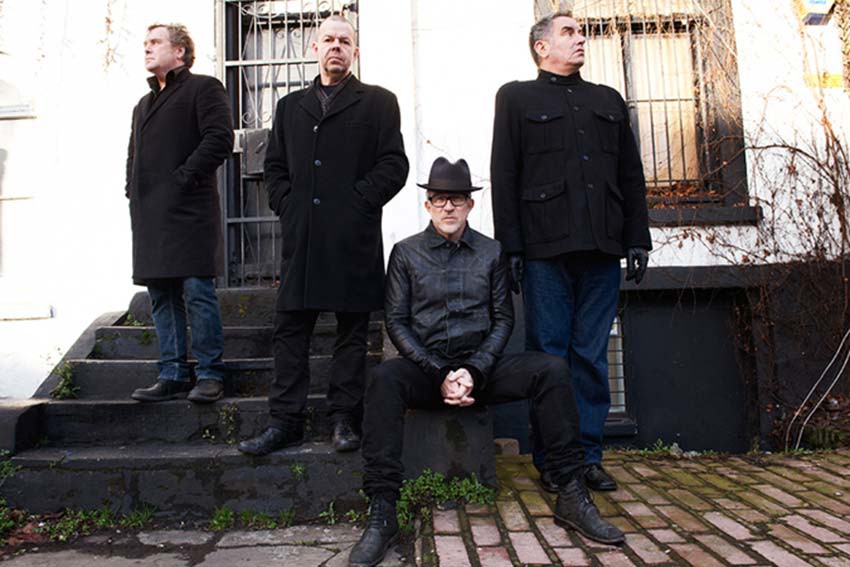The Pop Group

The Pop Group are a band from Bristol who formed as teenagers during the great punk insurrection of 1977. They fought on the British front lines.
The Pop Group are a band from Bristol who formed as teenagers during the great punk insurrection of 1977. They fought on the British front lines. Their first gig was as a support to a band called the Cortinas at the Marquee in Soho. They developed a fiercely individual style and wrote (in action) one of the codebooks of post-punk music. They drew on funk, free jazz and reggae to create a dynamic, propulsive style of wild music. A strain all their own. The lyrics were poetic yet supersized like slogans or banners at street marches. They demanded your action and reaction. Many tried to copy them but few could. Few had the skills and the timing, but a lot of it was to do with the scene they came from – Bristol. The southwestern English city is where Blackbeard the pirate hailed from. It was one of the major slave ports of the Elizabethan period (along with Cardiff, Belfast, Liverpool and London). Bristol has a black population going back centuries. The Pop Group acted like young people should in those revolutionary times. They demanded impossible things. They pushed studio engineers to the edge of their tempers and then pushed through. Their first album, on a label set up and run by noted music man Andrew Lauder, was called Y. They liked to ask questions. A reggae studio cat named Dennis Bovell produced it. They had bass heavy beats and lots of dub effects with wild and spindly lead guitar at the edges by Gareth Sager. You heard saxes blowing and pianos being pounded ‘treated’. They dived into decades of art and political thought and swam for ‘it’. In some ways, the Pop Group, Killing Joke, Wire and PIL defined that whole post-punk sound and created amazing music – all with the backing of an audience who hungered for new music, and large labels and giant media there to project it out into the world. In Melbourne, the Boys Next Door/Birthday Party heard it and tried some of those licks too. Our post-punk scene had them as giants, along with Ed Kuepper’s Laughing Clowns. Presence, aura, mystery and glamour – by the tonne. Singer Mark Stewart says: “There is the arrogance of power but we had the power of arrogance.” I spoke to him ahead of their tour here and, in reference to their beginnings, he says, “punk was all about flipping the script, so we brought in all the influences of stuff we were really excited about – free jazz to the reggae we were hearing in our neighbourhood. It wouldn’t have been punk to play punk.” The Pop Group did three albums and called it a day after playing to several hundred thousand people in Trafalgar Square at a CND rally in 1980. Stewart wanted to do a song that everybody might know, so they launched into Jerusalem, the William Blake poem, which had been set to music by Sir Hubert Parry in 1916. Owned for a time by the Suffragette movement, the song has been claimed recently by right wing people but was always sung at Labour rallies and marches. Stewart’s first solo record was a reimagining of this song with dub studio wizard Adrian Sherwood. They made it NEW and Stewart himself could have wrung the prophetic, clarion clear words from life. ‘Bring me my Bow of burning gold: Bring me my arrows of desire: Bring me my Spear: O clouds unfold! Bring me my Chariot of fire!’ Upon splitting, elements and members of the Pop Group went into Pigbag, Rip Rig + Panic and Mark Stewart and the Maffia, and produced people like Neneh Cherry. That wider Bristol scene also gave us Portishead, Massive Attack and Tricky. In the beginning, though, was the Pop Group. They all talk of ‘massives’ and ‘crews’ and the Pop Group must have been the first mothership for that scene. Now, 35 years after splitting, the Pop Group are back playing live and have recorded a new album, Citizen Zombie. I saw them play their first reformed show back in Edinburgh last year. The music was perfectly fierce. The original band had the addition of a young extra guitar player, whom Stewart assures me, is aging quickly by being in the Pop Group. Stewart, who I had seen performing with the Maffi in 1987, is not your run of the mill entertainer. He is for real. His lyrics are strong and direct. He mentioned a love for folk music when I talked to him, citing Ewan MacColl and others. I can hear this now. He sings as if on a box at Speakers’ Corner, haranguing life itself. Of course, he is so tall he would not need to stand on a box. The sound engineer treated his voice and all the drums with particular delays and reverbs, all the magic tricks of dub. The bass and drums were magnificent–- unheard of in rock music since the last time the Pop Group probably played. Original gangsters and prophetic groovers. Citizen Zombie is also evidence that their powers are undiminished. Full of giant hooks and choruses. Fantastic grooves and poetic reveries. They remain a watermark of what rock music can and could be. They are playing in Adelaide as part of the Adelaide Festival at a wonderful looking venue called the Freemasons Hall on Thursday, March 5 @davegraney